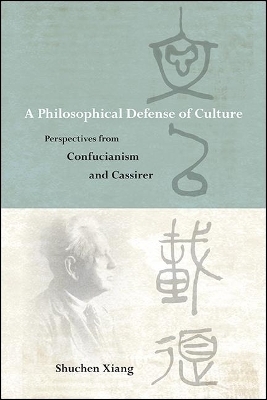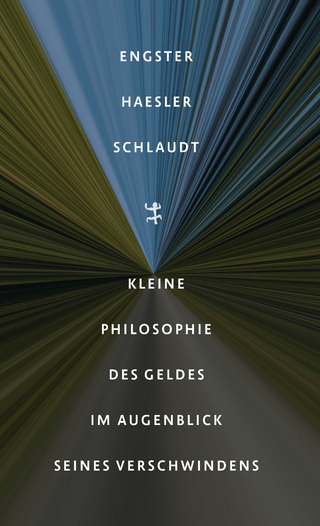
A Philosophical Defense of Culture
Perspectives from Confucianism and Cassirer
Seiten
2022
State University of New York Press (Verlag)
978-1-4384-8320-7 (ISBN)
State University of New York Press (Verlag)
978-1-4384-8320-7 (ISBN)
Draws on two different but strikingly similar streams in our world tradition to argue for the contemporary philosophical relevance of “culture.”
In A Philosophical Defense of Culture, Shuchen Xiang draws on the Confucian philosophy of "culture" and Ernst Cassirer's philosophy of symbolic forms to argue for the importance of "culture" as a philosophic paradigm. A defining ideal of Confucian-Chinese civilization, culture (wen) spans everything from natural patterns and the individual units that make up Chinese writing to literature and other refining vocations of the human being. Wen is thus the soul of Confucian-Chinese philosophy. Similarly, as a philosopher who bridged the classical age of German humanism and postwar modernity, Cassirer implored his and future generations to think of humankind in terms of their culture and to think of the human being as a "symbolic animal." The philosophies of culture of these two traditions, very much compatible, are of urgent relevance to our contemporary epoch. Xiang describes the similarity of their projects by way of their conception of the human being, her relationship to nature, the relationship of human culture to nature, the importance of cultural pluralism, and the role of the arts in human life, as well as the metaphysical frameworks that gave rise to such conceptions. Combining textual exegesis in classical Chinese texts and an exposition of Cassirer's most important insights against the backdrop of post-Kantian philosophy, this book is philosophy written in a cosmopolitan mode, arguing for the contemporary philosophical relevance of "culture" by drawing on and bringing together two different but strikingly similar streams in our world tradition.
In A Philosophical Defense of Culture, Shuchen Xiang draws on the Confucian philosophy of "culture" and Ernst Cassirer's philosophy of symbolic forms to argue for the importance of "culture" as a philosophic paradigm. A defining ideal of Confucian-Chinese civilization, culture (wen) spans everything from natural patterns and the individual units that make up Chinese writing to literature and other refining vocations of the human being. Wen is thus the soul of Confucian-Chinese philosophy. Similarly, as a philosopher who bridged the classical age of German humanism and postwar modernity, Cassirer implored his and future generations to think of humankind in terms of their culture and to think of the human being as a "symbolic animal." The philosophies of culture of these two traditions, very much compatible, are of urgent relevance to our contemporary epoch. Xiang describes the similarity of their projects by way of their conception of the human being, her relationship to nature, the relationship of human culture to nature, the importance of cultural pluralism, and the role of the arts in human life, as well as the metaphysical frameworks that gave rise to such conceptions. Combining textual exegesis in classical Chinese texts and an exposition of Cassirer's most important insights against the backdrop of post-Kantian philosophy, this book is philosophy written in a cosmopolitan mode, arguing for the contemporary philosophical relevance of "culture" by drawing on and bringing together two different but strikingly similar streams in our world tradition.
Shuchen Xiang is Assistant Professor in the Department of Philosophy and Religious Studies and the Institute of Foreign Philosophy at Peking University, China.
Acknowledgments
Abbreviations
Introduction
1. Humanism and Language: Cassirer and the Xici (系辞)
2. Li Xiang Yi Jin Yi (立象以尽意): Giving (Symbolic) Form to Phenomena
3. Shi Yan Zhi (诗言志): Giving (Poetic) Form to Qing (情)
4. Wen Yi Zai Dao (文以载道): Giving (Linguistic) Form to Dao
5. Zhi You Wen Ye (质犹文也): Giving (Human) Form to the Self
6. Wu Yi Wu Wen (物一无文): Organic Harmony
Conclusion
Appendix 1: Definitions of Wen
Appendix 2: A Brief History of Wen
Appendix 3: Partial Translation of Song Lian's "The Origins of Wen" (Wenyuan 文原)
Glossary
Notes
Works Cited
Index
| Erscheinungsdatum | 04.01.2022 |
|---|---|
| Reihe/Serie | SUNY series in Chinese Philosophy and Culture |
| Zusatzinfo | Total Illustrations: 0 |
| Verlagsort | Albany, NY |
| Sprache | englisch |
| Maße | 152 x 229 mm |
| Gewicht | 227 g |
| Themenwelt | Geisteswissenschaften ► Philosophie ► Metaphysik / Ontologie |
| Geisteswissenschaften ► Philosophie ► Östliche Philosophie | |
| Geisteswissenschaften ► Religion / Theologie ► Weitere Religionen | |
| ISBN-10 | 1-4384-8320-1 / 1438483201 |
| ISBN-13 | 978-1-4384-8320-7 / 9781438483207 |
| Zustand | Neuware |
| Haben Sie eine Frage zum Produkt? |
Mehr entdecken
aus dem Bereich
aus dem Bereich
Buch | Hardcover (2024)
Matthes & Seitz (Verlag)
28,00 €
Über konstruktivistisches Denken in der Theologie
Buch | Softcover (2024)
Verlag Herder
58,00 €


